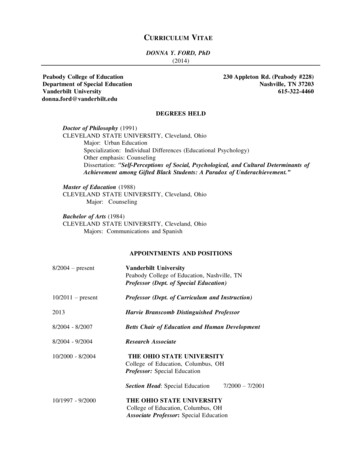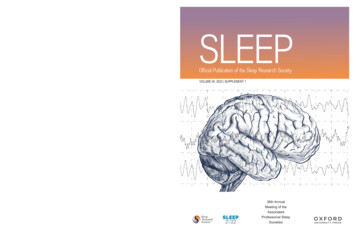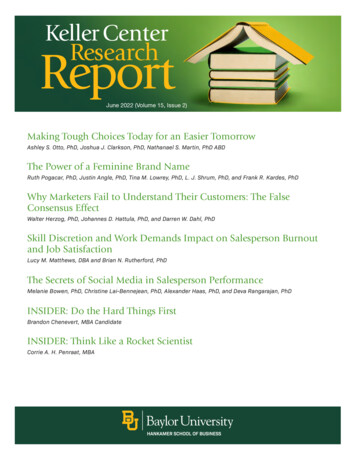
Transcription
CURRICULUM VITAEDONNA Y. FORD, PhD(2014)Peabody College of EducationDepartment of Special EducationVanderbilt Universitydonna.ford@vanderbilt.edu230 Appleton Rd. (Peabody #228)Nashville, TN 37203615-322-4460DEGREES HELDDoctor of Philosophy (1991)CLEVELAND STATE UNIVERSITY, Cleveland, OhioMajor: Urban EducationSpecialization: Individual Differences (Educational Psychology)Other emphasis: CounselingDissertation: "Self-Perceptions of Social, Psychological, and Cultural Determinants ofAchievement among Gifted Black Students: A Paradox of Underachievement.”Master of Education (1988)CLEVELAND STATE UNIVERSITY, Cleveland, OhioMajor: CounselingBachelor of Arts (1984)CLEVELAND STATE UNIVERSITY, Cleveland, OhioMajors: Communications and SpanishAPPOINTMENTS AND POSITIONS8/2004 – presentVanderbilt UniversityPeabody College of Education, Nashville, TNProfessor (Dept. of Special Education)10/2011 – presentProfessor (Dept. of Curriculum and Instruction)2013Harvie Branscomb Distinguished Professor8/2004 - 8/2007Betts Chair of Education and Human Development8/2004 - 9/2004Research Associate10/2000 - 8/2004THE OHIO STATE UNIVERSITYCollege of Education, Columbus, OHProfessor: Special EducationSection Head: Special Education10/1997 - 9/20007/2000 – 7/2001THE OHIO STATE UNIVERSITYCollege of Education, Columbus, OHAssociate Professor: Special Education
Curriculum Vitae1993 - 1997DONNA Y. FORD, PHDPage 2THE UNIVERSITY OF VIRGINIACurry School of Education, Charlottesville, VAAssociate Professor: Educational Psychology Program (Gifted Education)(1996-97)Assistant Professor: Educational Psychology Program (Gifted Education)(1993-96)1990 - 1993THE UNIVERSITY OF KENTUCKYCollege of Human Environmental Sciences, Lexington, KYAssistant Professor (1991-1993)Minority Research ScholarMultidisciplinary Research Center on Drug and Alcohol AbuseResearch and Graduate StudiesUniversity Counseling and Testing CenterStudent Affairs Officer III (8/90 - 10/91)1987 - 1990CLEVELAND STATE UNIVERSITYCollege of Education, Urban Educational Research CenterCleveland, OHResearch Assistant and Instructor (9/89 – 8/90)College of EducationDepartment of Educational SpecialistsInstructor and Research Assistant (9/88 - 8/89)Counseling CenterCounselor (6/87 – 9/87; 1/88 - 6/88)CERTIFICATIONSState of Ohio, General Aptitude Test Battery (GATB) (1989)AWARDS AND HONORSNAACP Image Award Nominee for Literature (Instruction), Recruiting and Retaining CulturallyDifferent Students in Gifted Education, 2014.Outstanding Service Award, The Organization of Black Graduate and Professional Students(OBGAPS), Vanderbilt University, Nashville, TN, 2014.Distinguished Faculty Award Nominee, Black Student Alliance, Vanderbilt University, Nashville,TN, 2014.SEC Academic Consortium’s Faculty Achievement Award, Vanderbilt University, Nashville,TN, 2013.The Harvie Branscomb Distinguished Professor Award, Vanderbilt University, Nashville, TN,
Curriculum VitaeDONNA Y. FORD, PHDPage 32013.Jimmie Franklin Outstanding Vanderbilt Faculty Award, Vanderbilt University, Nashville, TN,2011.Outstanding Service Award, Council for Exceptional Children and The Association for the Gifted(CEC-TAG), Washington, DC, 2011.Distinguished Faculty Award, Black Student Alliance, Vanderbilt University, Nashville, TN,2011.Who’s Who in America, 2010, 2011.Who’s Who in Education, 2003, 2009.Distinguished Faculty of the Game Award Department of Student Athletes, VanderbiltUniversity, Nashville, TN, 2009.Distinguished Scholar Award, National Association for Gifted Children, Washington DC, 2008.Senior Scholar in Gifted Education Award, The American Educational Research Association,Gifted Education SIG, Washington, DC, 2007.Affirmative Action and Diversity Initiatives Award, Vanderbilt University, Nashville, TN, 2006.John W. Porter Distinguished Chair in Urban Education (Speakers Series), Eastern MichiganUniversity, Ypsilanti, MI, 2005.Scholar of Color Distinguished Career Contribution Award, The American Educational ResearchAssociation, 2005.College of Education, 2004 Distinguished Scholarship Award, The Ohio State University,Columbus, OH, 2004.College of Education, 2004 Distinguished Diversity Award, The Ohio State University, Columbus,OH, 2004.The Distinguished Educator Award, Central Cities Gifted Children’s Association, Los Angeles,CA, 2002.Distinguished Lecturer, Southern Methodist University, Gifted Students Institute, Dallas, TX,1997-1998.Book Award Semifinalist, American Educational Research Association (ReversingUnderachievement Among Gifted Black Students: Promising Practices and Programs, 1997).Choice’s Outstanding Academic Book Award (Reversing Underachievement Among Gifted BlackStudents, 1997).Research Award, Shannon Center for Advanced Studies, The University of Virginia,
Curriculum VitaeDONNA Y. FORD, PHDPage 4Charlottesville, VA, summer, 1996-97.World’s Who’s Who of Women (13th edition), 1996-97.Scholar of Color Early Career Contribution Award, American Educational Research Association,1996.Lecturer, Carter G. Woodson Distinguished Lecturer Series, African-American Studies andResearch Program, The University of Kentucky, College of Arts and Sciences, 1995-96.Faculty Research Award, The Black Graduate Students in Education, The University of Virginia,Charlottesville, VA, 1995.Early Scholar Award, National Association for Gifted Children, Washington, DC, 1994.The Esteemed Scholarship Award, National Association of Black Psychologists, Ft. Washington,MD, 1993.The Emerging Alumni Leadership Award, Cleveland State University, Cleveland, OH, 1993.Who's Who In American Education, 1992-93, 1993-94, 1994-95.Fellow, Institute for Children, Youth, and Families, held at Michigan State University, 1992 (twoweek institute).Primary Professional and Scholarly Interests Gifted Education & Educational Psychology (underachievement; identification and assessment;equity; social, emotional and psychological development; and multicultural counseling)Urban Education and Achievement Gaps (cultural differences; multicultural education; culturallyresponsive education)Family Issues (family achievement orientation and family involvement)Cross-Cultural Child Development (Cross-cultural child rearing practices; family values andtraditions)PUBLICATIONSBOOKSScott-Carroll, J., Ford, D.Y., Sparks, A., & Goings, R. (Eds.). (under contract). Ambassadors ofgiftedness: Insightful narratives of culturally different gifted adults. Scottsdale, AZ: Information AgePublishing (to be published in 2015)Ford, D.Y. (under contract). “I need a new teacher”: How deficit thinking undermines Blackstudents’ representation in gifted education and AP classes. Waco, TX: Prufrock Press.Moore III, J.L. & Ford, D.Y. (under contract). Multicultural counseling for diverse gifted learners:A guide for practice. Thousand Oaks, CA: Sage Publications.
Curriculum VitaeDONNA Y. FORD, PHDPage 5Ford, D.Y. & Trotman Scott, M. (under contract). Multicultural literature for gifted students:Grades 2-8. Waco, TX: Prufrock Press.Trotman Scott, M. & Ford, D.Y. (Eds.). (in progress). RACE Mentoring through social media:Black and Hispanic scholars share their journey in the academy.Ford, D.Y. (2013). Recruiting and retaining culturally different students in gifted education. Waco,TX: Prufrock Press. 2014 NAACP Image Award Nominee for Literature (Instruction).Ford, D.Y. (2011). Multicultural gifted education: Rationale, models, strategies, and resources (2nded.). Waco, TX: Prufrock Press.Grantham, T.C., Ford, D.Y., Henfield, M., Trotman Scott, M., Harmon, D., Porchér, S., & Price,C.). (2011). Gifted and advanced Black students in school: An anthology of critical works. Waco, TX:Prufrock Press.Ford, D.Y. (2010). Reversing underachievement among gifted Black students: Theory, Researchand Practice (2nd ed.). Waco, TX: Prufrock Press. (Nominated for 2010 Texas Association for the Gifted,Legacy Book Award.)Cartledge, G., Gardner, R., & Ford, D.Y. (2008). Diverse learners with exceptionalities: Culturallyresponsive teaching in the inclusive classroom. Columbus, OH: Merrill Education.Ford, D.Y. & Milner, H.R. (2005). Teaching culturally diverse gifted students. Waco, TX: PrufrockPress.Tomlinson, C.A., Ford, D.Y., Reis, S.M., Briggs, C.J., & Strickland, C.A. (Eds.). (2004). In search ofthe dream: Designing schools and classrooms that work for high potential students from diverse culturalbackgrounds. Washington, DC: National Association for Gifted Children.Ford, D.Y. & Harris III, J.J. (1999). Multicultural gifted education. New York: Teachers CollegePress.Ford, D.Y. (1996). Reversing underachievement among gifted Black students: Promising practicesand programs. New York: Teachers College Press.REFEREED ARTICLESFord, D.Y. & Russo, C.J. (in press). “No child left behind . . . unless a student is gifted and of color:Reflections on the need to meet the educational needs of the gifted.” Journal of Law in Society.Ford, D.Y. & Russo, C.J. (in press). Legal issues impacting racially and culturally differentgifted learners. Excellence and Diversity in Gifted Education.Stambaugh, T. & Ford, D.Y. (in press). Microaggressions, multiculturalism, and gifted individualswho are Black, Hispanic, or poor: Cultural and economic considerations for counseling. Journal ofCounseling and Development.
Curriculum VitaeDONNA Y. FORD, PHDPage 6Naglieri, J. & Ford, D.Y. (submitted). Misconceptions about the Naglieri Nonverbal Ability Test:A commentary of concerns and disagreements. Roeper Review.Ford, D.Y. & King, R.A. (2014). No Blacks allowed: Segregated gifted education in the context ofBrown vs. Board of Education. Journal of Negro Education, 83(3), 300-310.Ford, D.Y. & King, R.A. (2014, Fall). Desegregating gifted education for under-represented Blackand Hispanic students: Equity promotes equality. Teaching for High Potential, 1, 13-16.Ford, D.Y. (2014). Segregation and the underrepresentation of Blacks and Hispanics in giftededucation: Social inequality and deficit paradigms. Roeper Review, 36, 143-154.Bryan, N. & Ford, D.Y. (2014). Recruiting and retaining Black male teachers in gifted education.Gifted Child Today, 37, 156-161.Ford, D.Y. (2014). Why education must be multicultural: Addressing a few misperceptions withcounterarguments. Gifted Child Today, 37(1), 60-63.Ford, D.Y. & Moore III, J.L. (2013). Understanding and reversing underachievement andachievement gaps among high-ability African American males in urban school contexts. Urban Review,45(4), 400-415.Ford, D.Y., Trotman Scott, M., Moore III, J.L., & Amos, S.O. (2013). Gifted education andculturally different students: Examining prejudice and discrimination via microaggressions. Gifted ChildToday, 36(3), 205-208.Ford, D.Y. (2013). Gifted under-representation and prejudice: Learning from Allport and Merton.Gifted Child Today, 36, 62-68. (Reprinted in Gifted Education Press Quarterly, 2013)Ford, D.Y. (2012). Racially, ethnically, and linguistically different students in special education:Looking backward to move forward. Exceptional Children, 78(4), 391-405.Ford, D.Y., Moore III, J.L., & Trotman Scott, M. (2011). Key theories and frameworks forimproving the recruitment and retention of African American students in gifted education. Journal of NegroEducation, 80(3), 239-253.Hughes, C. Page, A., & Ford, D.Y. (2011). Cultural dynamics in an economically challenged,multiethnic middle school: Student perceptions. Journal of At-Risk Issues, 16(1), 9-16.Ford, D.Y. (2011). Closing the achievement gap: Gifted education must join the battle. GiftedChild Today, 31(1), 31-35. (Column)Ford, D.Y. (2010). Underrepresentation of culturally different students in gifted education:Reflections about current problems and recommendations for the future. Gifted Child Today, 33(3), 31-36.(Column)Ford, D.Y. (2010). Culturally responsive classrooms: Affirming culturally different gifted students.Gifted Child Today, 33(1), 50-53. (Column)Ford, D.Y. & Whiting, G.W. (2010). Beyond testing: Social and psychological considerations in
Curriculum VitaeDONNA Y. FORD, PHDPage 7recruiting and retaining gifted Black students. Journal for the Education of the Gifted, 34(1), 131-155.Ford, D.Y. & Kea, C.D. (2009). Creating culturally responsive instruction: For students’ sake andteachers’ sake. Focus on Exceptional Children, 41(9), 1-18.Whiting, G.W. & Ford, D.Y. (2009). Black students and Advanced Placement classes: Summary,concerns, and recommendations. Gifted Child Today, 32(1), 23-26.Ford, D.Y., Moore III, J.J. Whiting, G.W., & Grantham, T.C. (2008). Conducting cross-culturalresearch: Cautions, concerns, and considerations. Roeper Review, 30(1), 82-92.Ford, D.Y. & Whiting, G.W. (2008). Cultural competence: Preparing gifted students for a diversesociety. Roeper Review, 30(2) 104-110.Whiting, G.W., Ford, D.Y., Grantham, T.C., & Moore III, J.J. (2008). Considerations forconducting culturally responsive research in gifted education. Gifted Child Today, 31(3), 26-29.Ford, D.Y., Grantham, T.C., & Whiting, G.W. (2008). Culturally and linguistically diversestudents in gifted education: Recruitment and retention issues. Exceptional Children, 74(3), 289-308.Ford, D.Y., Grantham, T.C., & Whiting, G.W. (2008). Another look at the achievement gap:Learning from the experiences of gifted Black students. Urban Education, 43, 216-239.Hughes, C., Manns, N.N., & Ford, D.Y. (2008). Racial identity attitudes and academicachievement among at-risk Black female adolescents. The Journal of At-Risk Issues, 15(1), 25-32.Ford, D.Y. & Whiting, G.W. (2007). A mind is a terrible thing to erase: Black students’ underrepresentation in gifted education. Multiple Voices, 10(1 & 2), 28-44.Milner, H.R. & Ford, D.Y. (2007). Cultural considerations in the under-representation of culturallydiverse elementary students in gifted education. Roeper Review, 29(3), 166-173.Ford, D.Y. & Whiting, G.W. (2007). Another perspective on cultural competence: Preparingstudents for an increasingly diverse society. Gifted Child Today, 30(2), 52-55.Moore III, J.L., Ford, D.Y., Owens, D., Hall, T., Byrd, M., Henfield, M., & Whiting, G.W. (2006).Recruitment of African Americans in gifted education: Lessons learned from higher education. MidWestern Educational Research Journal, 19(2), 3-12.Ford, D.Y. & Whiting, G.W. (2006, web exclusive). Recruiting diverse students in giftededucation: Principal, 86(3). http://www.naesp.org/ContentLoad.do?contentId 2143.Ford, D.Y. & Joseph, L.M. (2006). Non-discriminatory assessment: Considerations for giftededucation. Gifted Child Quarterly, 50(1), 41-51.Ford, D.Y. (2006). Closing the achievement gap: How gifted education can help. Gifted ChildToday, 29(4), 14-18.Ford, D.Y., Moore III, J.L., & Milner, H.R. (2005). Beyond cultureblindness: A model of culturewith implications for gifted education. Roeper Review, 27(2), 97-103.
Curriculum VitaeDONNA Y. FORD, PHDPage 8Ford, D.Y. (2005). Welcoming all students to room 202: Creating culturally responsive classrooms.Gifted Child Today, 28, 28-30, 65.Milner, H.R. & Ford, D.Y. (2005). Racial experiences influence us as teachers: Implications forgifted education curriculum development and implementation. Roeper Review, 28(1) 30-36.Ford, D.Y., Moore III, J.L., & Harmon, D.A. (2005). Integrating multicultural education and giftededucation: A curricular framework. Theory Into Practice, 44(2), 125-137.Moore III, J.L., Ford, D.Y., & Milner, H.R. (2005).Underachievement among gifted students ofcolor: Implications for educators. Theory Into Practice, 44(2), 167-177.Naglieri, J.A. & Ford, D.Y. (2005). Increasing minority children’s representation in giftededucation: A response to Lohman. Gifted Child Quarterly, 49(1), 29-36.Moore III, J., Ford, D.Y., & Milner, H.R. (2005). Recruitment is not enough: Retaining AfricanAmerican students in gifted education. Gifted Child Quarterly, 49(1), 51-67.Ford, D.Y. (2004). A challenge for culturally diverse families of gifted children: Forced choicesbetween affiliation or achievement. Gifted Child Today, 27(3), 26-29.Ford, D.Y. & Moore III, J.L. (2004). Creating culturally responsive gifted education classrooms:Understanding “culture” is the first step. Gifted Child Today, 27(4), 34-39.Harris III, J.J., Brown, E.L., Ford, D.Y., & Richardson, J.W. (2004). American Americans andmulticultural education: A proposed remedy for disproportionate special education placement and underinclusion in gifted education. Education and Urban Society, 36, 304-341.Ford, D.Y. (2003). Two wrongs don’t make a right: Sacrificing the needs of diverse students doesnot solve gifted education’s unresolved problems. Journal for the Education of the Gifted, 26(4), 283-291.Naglieri, J.A. & Ford, D.Y. (2003). Addressing under-representation of gifted minority childrenusing the Naglieri Nonverbal Ability Test (NNAT). Gifted Child Quarterly, 47, 155-160.Ford, D.Y. & Grantham, T.C. (2003). Providing access for gifted culturally diverse students: Fromdeficit thinking to dynamic thinking. Theory into Practice, 42(3), 217-225.Grantham, T.C. & Ford, D.Y. (2003). Beyond self-concept and self-esteem for African-Americanstudents: Improving racial identity improves achievement. High School Journal, 87(1), 18-29.Ford, D.Y., Harris III, J.J., Tyson, C.A., & Frazier Trotman, M. (2002). Beyond deficit thinking:Providing access for gifted African American students. Roeper Review, 24(2), 52-58Ford, D.Y. (2002). Creating culturally responsive classrooms for gifted students. Our GiftedChildren, 91, 5-10.Ford, D.Y. & Harmon, D.A. (2001). Equity and excellence: Providing access to gifted educationfor culturally diverse students. Journal of Secondary Gifted Education, 12, 141-147. (reprinted in Natoli, M.(Ed.). (2006). Taking sides: Clashing views in public policy, justice, and the law. Dubuque, IA: McGrawHill Contemporary Learning Series).
Curriculum VitaeDONNA Y. FORD, PHDPage 9Davidson, J.C. & Ford, D.Y. (2001). Perceptions of attention deficit hyperactivity disorder in oneAfrican American community. Journal of Negro Education, 70(4), 264-274.Gardner III, R., Ford, D.Y., & Miranda, A. (2001). The education of African American studentswith exceptionalities: The struggle continues. Journal of Negro Education, 70(4), 241-242. (Introductionand overview of special issue co-edited with Gardner and Miranda.)Ford, D.Y. & Frazier Trotman, M. (2001). Teachers of gifted students: Suggested multiculturalcharacteristics and competencies. Roeper Review, 23(4), 235-239.Ford, D.Y. (2001). Commentary on “James: Encouraging a reluctant reader”. Roeper Review,23(4), 215-216.Ford, D.Y. & Frazier Trotman, M. (2000). The Office for Civil Rights and non-discriminatorytesting, policies, and procedures: Implications for gifted education. Roeper Review, 23(2), 109-112.Ford, D.Y., Howard, T.C., Tyson, C.A., & Harris III, J.J. (2000). Creating culturally responsiveclassrooms for gifted minority students. Journal for the Education of the Gifted, 23(4), 397-427.Ford, D.Y. & Harris III, J.J. (2000). A framework for infusing multicultural curriculum into giftededucation. Roeper Review, 23(1), 4-10.Ford, D.Y., Tyson, C.A., Howard, T.C., & Harris III, J.J. (2000). Multicultural literature and giftedBlack students: Promoting self-understanding, awareness, and pride. Roeper Review, 22(4), 235-240.Harris III, J.J. & Ford, D.Y. (1999). Hope deferred again: Gifted minority students underrepresented in gifted education. Education and Urban Society, 31(2), 225-237.Ford, D.Y., Howard, T.C., & Harris III, J.J. (1999). Using multicultural literature in giftededucation classrooms. Gifted Child Today, 22(4), 14-21.Grantham, T.C. & Ford, D.Y. (1998). A case study of the social needs of Danisha: Anunderachieving African-American female. Roeper Review, 21(2), 96-101.Ford, D.Y. (1998). The under-representation of minority students in gifted education: Problems andpromises in recruitment and retention. The Journal of Special Education, 32(1), 4-14. (2nd most cited article asof June 1, 2012 for this journal, see , J.M., Hallahan, D.P., & Ford, D.Y. (1998). Introduction to the special section. TheJournal of Special Education, 32(1), 3.Ford, D.Y., Alber, S.R., & Heward, W.L. (1998). Setting “motivation traps” for underachievinggifted students. Gifted Child Today, 21(2), 28-33. Reprinted in: S. K. Johnsen, & J. Kendrick (Eds.) (2005).Teaching strategies in gifted education (pp. 159-168). Waco, TX: Prufrock Press, Inc.Grantham, T.C., & Ford, D.Y. (1998). Principal instructional leadership can reverse the underrepresentation of Black students in gifted education. NASSP Journal, 82(595), 101-109.Ford, D.Y., Wright, L.B., Grantham, T.C., & Harris III, J.J. (1998). Achievement levels, outcomes,and orientations of Black students in single- and two-parent families. Urban Education, 33(3), 360-384.Ford, D.Y., Baytops, J.L., & Harmon, D. A. (1997). Helping gifted minority students reach theirpotential: Recommendations for change. Peabody Journal of Education, 72 (3/4), 201-216.
Curriculum VitaeDONNA Y. FORD, PHDPage 10Ford, D.Y., Grantham, T.C., & Harris III, J.J. (1997). The recruitment and retention of minorityteachers in gifted education. Roeper Review, 19(4), 213-220.Russo, C.J., Ford, D.Y., & Harris III, J.J. (1997). Giving the gifted their fair share. School BusinessAffairs, 63(5), 21-24.Stephens, J. & Ford, D.Y. (1997). Self-concept, racial identity, and academic achievement amongAfrican-American students in higher education. Negro Education Review, 48(3/4), 131-140.Ford, D.Y. & Thomas, A. (1997, June). Underachievement among gifted minority students:Problems and promises. ERIC Digest, E544, 1-4.Ford, D.Y. & Harris III, J.J. (1997). A study of the racial identity and achievement of Black malesand females. Roeper Review, 20(2), 105-110.Ford, D.Y. & Harris III, J.J. (1996). Perceptions and attitudes of Black students toward school,achievement, and other educational variables. Child Development, 67(3), 1141-1152.Russo, C.J., Harris III, J.J., & Ford, D.Y. (1996). Gifted education and the law: A right, privilege,or superfluous? Roeper Review, 18(3), 179-182.Ford, D.Y., Grantham, T.C., & Harris III, J.J. (1996). Multicultural gifted education: A wakeupcall to the profession. Roeper Review, 19(2), 72-78.Ford, D.Y., Feist-Price, S., Jones, D.L., Wright, L.B., Strutchens, M., Stephens, J.E., & Harris III,J.J. (1996). Family diversity: Perceptions of university students relative to gender and college major. UrbanEducation, 31(1), 91-106. (Reprinted in L. Stone (Ed.). (1998). Selected Readings on Marriage & Family.New York: Sage.Ford, D.Y. (1995). Desegregating gifted education: A need unmet. Journal of Negro Education,64(1), 52-62.Ford, D.Y., Harris III, J.J., & Russo, C.J. (1995). Meeting the educational needs of the gifted: Alegal imperative. Roeper Review, 17(4), 224-228.Ford, D.Y. & Harris III, J.J. (1995). Underachievement among gifted African-American students:Implications for school counselors. The School Counselor, 42(3), 196-203.Ford, D.Y. & Harris III, J.J. (1995). Exploring university counselors' perceptions of distinctionsbetween achievement among gifted Black and gifted White students. Journal of Counseling andDevelopment, 73(4), 443-450.Ford, D.Y. (1994/1995). Underachievement among gifted and non-gifted Black females: A studyof perceptions. Journal of Secondary Gifted Education, 6(2), 165-175.Ford, D.Y. (1994). Nurturing resilience in gifted Black youth. Roeper Review, 17(2), 80-85.Ford, D.Y. & Webb, K.S. (1994). Desegregation of gifted educational programs: The impact ofBrown on underachieving children of color. Journal of Negro Education, 63(3), 358-375. (Reprinted in theJournal of Negro Education Yearbook, entitled Brown v. Board of Education at 40: A commemorative to
Curriculum VitaeDONNA Y. FORD, PHDPage 11Thurgood Marshall).Ford, D.Y. & Harris III, J.J. (1994). Promoting achievement among gifted Black students: Theefficacy of new definitions and identification practices. Urban Education, 29(2), 202-229.Ford, D.Y. (1994). An exploration of perceptions of alternative family structures among universitystudents. Family Relations, 43(1), 68-73.Feist-Price, S. & Ford-Harris, D.Y. (1994). Rehabilitation counseling: Issues specific to providingservices to African American clients. The Journal of Rehabilitation, 60(4), 13-19.Ford, D.Y., Harris III, J.J., Webb, K.S., & Jones, D.L. (1994). Rejection or confirmation of racialidentity: A dilemma for high-achieving Blacks? Journal of Educational Thought, 28(1), 7-33. (Translatedfrom French).Ford, D.Y. (1994). Noticeably absent in gifted education: African-American students. PsychDiscourse, 1-5.Ford, D.Y. & Harris III, J.J. (1994). Reform and gifted Black students: Promising practices inKentucky. Journal for the Education of the Gifted, 17(3), 216-240.Ford, D.Y., Webb, K. S., & Sandidge, R.F. (1994). When gifted kids grow up: Counseling giftedcollege students requires an understanding of their special needs. Gifted Child Today, 17(3), 34-36, 4042.Russo, C. J., Harris III, J.J., & Ford, D.Y. (1994). The Kentucky Education Reform Act and giftededucation: Overlooked or ignored? The Kentucky Children's Rights Journal, 3(2), 1-8.Ford, D.Y. (1993). Black students' achievement orientation as a function of perceived familyachievement orientation and demographic variables. Journal of Negro Education, 62(1), 47-66.Ford, D.Y. (1993). An investigation of the paradox of underachievement among gifted BlackAmerican students. Roeper Review, 16(2), 78-84. (Reprinted in a special issue of the Mensa ResearchJournal.)Ford, D.Y., Harris III, J.J., & Russo, C.J. (1993). The quest for equity in gifted education. GiftedChild Today, 16(6), 8-11.Russo, C.J., Ford, D.Y., & Harris III, J.J. (1993). The educational rights of gifted children: Lost inthe legal shuffle? Roeper Review, 16(1), 67-71.Ford, D.Y., Harris III, J.J., & Schuerger, J.M. (1993). Racial identity development among giftedBlack students: Counseling issues and concerns. Journal of Counseling and Development, 71(4), 409-417.Ford, D.Y. & Feist, S. (1993). Educational reform and gifted African-American students. GiftedChild Today, 16(2), 40-43.Ford, D.Y. (1993). Support for the achievement ideology and determinants of underachievement asperceived by gifted, above-average, and average Black students. Journal for the Education of the Gifted,16(3), 280-298.
Curriculum VitaeDONNA Y. FORD, PHDPage 12Ford, D.Y. & Harris III, J.J. (1993). Educational reform and the focus on gifted African-Americanstudents. Roeper Review, 15(4), 200-204.Ford, D.Y. (1992). Self-perceptions of underachievement and support for the achievement ideologyamong early adolescent African Americans. Journal of Early Adolescence, 12(3), 228-252.Ford, D.Y. & Harris III, J.J. (1992). The American achievement ideology and achievementdifferentials among preadolescent gifted and non-gifted African-American males and females. Journal ofNegro Education, 61(1), 45-64.Ford, D.Y. & Harris III, J.J. (1992). The elusive definition of creativity. The Journal of CreativeBehavior, 26(3), 186-198.Ford, D.Y. (1992). The American achievement ideology as perceived by urban African-Americanstudents: Explorations by gender and academic program. Urban Education, 27(2), 196-211.Ford, D.Y. (1992). Determinants of underachievement as perceived by gifted, above-average, andaverage Black students. Roeper Review, 14(3), 130-136. (Reprinted in a special issue of the MensaResearch Journal.)Harris III, J.J. & Ford, D.Y. (1991). Identifying and nurturing the promise of gifted Black students.Journal of Negro Education, 60(1), 3-18. (Reprinted in a special issue of the Mensa Research Journal.)Ford-Harris, D.Y., Schuerger, J. M., & Harris III, J.J. (1991). Meeting the psychological needs ofgifted Black students: A cultural perspective. Journal of Counseling and Development, 69(6), 577-580.Harris III, J.J., & Ford, D.Y. (1991). An educational imperative: Meeting the needs of young,gifted, and Black students. Early Education, 11, 8-14.Harris III, J.J., Ford, D.Y., Wilson, P., & Sandidge, R. (1991). What should our public choose? Thedebate over school choice policy. Education and Urban Society, 23(2), 159-174Harris III, J.J. & Ford, D.Y. (1991). Dissonance in the educational ecology. MetropolitanUniversities, 2(3), 75-83.Ford, D.Y. & Harris III, J.J. (1990). Black students: At promise not "at risk" for giftedness. Journalof Human Behavior and Learning, 7(2), 21-30.Ford, D.Y. & Harris III. J.J. (1990). On discovering the hidden treasure of gifted and talentedBlack children. Roeper Review, 13(1), 27-32.Ford, D.Y. & Harris III, J.J. (1990). Play: The educational partner in cognitive development. EarlyEducation, 10, 13-18.Ford, D.Y. & Harris III, J.J. (1990). Identifying diamonds in the rough: Gifted and talented Blackchildren. The Gifted Child Today, 13(3), 17-21.Ford, D.Y., Harris III, J.J., & Clark, S. B. (1990). The silent partner in cognitive development: Playrevisited. Journal of Human Behavior and Learning, 7(1), 82-90.
Curriculum VitaeDONNA Y. FORD, PHDPage 13Ford, D.Y. & Harris III, J.J. (1990/1991, Winter). Head Start: Beyond a dose of cognitive medicinefor "at-risk" children. Journal of Social and Behavioral Sciences, 36(1), 41-56.Ford-Harris, D.Y., Harris III, J.J., & Winborne, D.G. (1990). The coloring of IQ testing: A newname for an old phenomenon. The Urban League Review Policy Research Journal, 13(1/2), 99-111.Ford, D.Y., Harris III, J.J., & Turner, W.L. (1990/1991). The extended African-American family:A pragmatic strategy that blunts the blades of injustice. The Urban League Review Policy Research Journal,14(2), 71-83.Harris III, J.J., Ford, D.Y., Sandidge, R.F., & Turner, W.L. (1989). The rediscovery of play incognitive development. Capstone Journal of Education, 9(2), 22-39.Ford, D.Y., Harris III, J.J., & Winborne, D.G. (1989). Determinants of underachievement amonggifted Black students: Learning to underachieve. Journal of S
Curriculum Vitae DONNA Y. FORD, PHD Page 2 1993 - 1997 THE UNIVERSITY OF VIRGINIA Curry School of Education, Charlottesville, VA Associate Professor: Educational Psychology Program (Gifted Education) (1996-97) Assistant Professor: Educational Psychology Program (Gifted Education) (1993-96) 1990 - 1993 THE UNIVERSITY OF KENTUCKY College of Human Environmental Sciences, Lexington, KY










